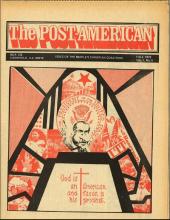A strong and visible prophetic witness was presented to the delegates at Explo '72, an 80,000-person evangelical gathering in Dallas, and to the American public which viewed the event. The Friday night edition of the Dallas Evening Times on June 23rd contained the following front page headline: "War Vs. Peace at Explo '72." The opening paragraph began: "Two themes emerged as Explo entered its fourth day Thursday—war and peace—and the Christian militants of the Prince of Peace and the might of the military were both in evidence." The activities and words of the prophetic witness at Explo have been covered widely by the media (both Dallas daily newspapers, Time, Life, Saturday Review, Boston Phoenix, Dallas Iconoclast, Washington Post, Christianity Today, Reformed Journal, etc.). Peter Ediger reports on the event.—The Editors
It came to pass in the summer of '72 that many young people gathered in Dallas, Texas, for Explo, a week of training for Christian witness sponsored by Campus Crusade for Christ. They came from Florida and British Columbia, from Ontario and California and many states and provinces in between, and a few also came from beyond North America.
And while they were there they sang many songs and heard many speeches, and saw many exhibits, and assembled in many groups to be taught to witness to the Four Spiritual Laws. And everywhere young people were saying "Praise the Lord" and giving the "One-Way" sign to each other.
And they gathered in the Cotton Bowl nightly to hear music and testimonies and speeches by Bill Bright and Billy Graham and others. And the sound of their cheering and clapping and "Praise-the-Lord" chanting filled the Bowl and overflowed into the surrounding area.
Read the Full Article

